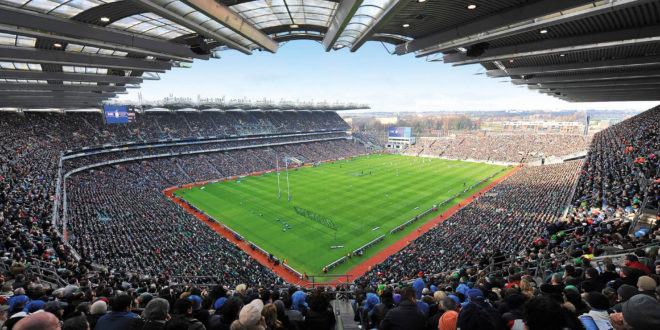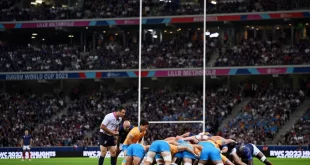It is full speed ahead for Ireland’s Rugby World Cup 2023 bid. The ‘small island on the end of the world’ is ‘ready for the world’. These are two of the phases used by the IRFU to promote their bid. Together they provide clarity as to Ireland’s determination to host and reason for meriting the opportunity.
Hosting Model
World Rugby does not have a concrete example of a model for hosting. Instead it offers guidelines. From there different countries stage the tournament in their own way. In 2007 France had ten stadiums which each hosted either three or four pool matches. They were joined by Cardiff and Edinburgh with three and two respectively.
So successful was the model within France that 97% of tickets were sold. Of all the venues only Montpellier was not at or close to capacity for all matches.
In 2011 New Zealand hosted differently. Napier, Palmerston North and Whangarei each had two matches. Nelson was to also have this number. With Christchurch missing out due to earthquake damage Nelson hosted a third game. Auckland and Wellington took on senior roles, more so than Paris and Marseilles for pool matches.
England 2015 saw London far-and-away the center piece of the event. In 2011 and 2007 Auckland and Paris had two venues each while London had three in 2015. A record 17 games were played in London. Cardiff was the supporting city. This meant a foreign city took on a senior supporting role. This meant only two games for Birmingham, Brighton and Leeds and one for Manchester. The Irish played only in London and Cardiff.
Ireland is looking to replicate 2015 by having three venues in Dublin. They are to be joined by ten other stadiums spread around the island. Belfast will have two and Londonderry one to give Northern Ireland three stadiums. Connacht province will have Castlebar and Galway. Munster will have Cork, Killarney and Limerick. Leinster will have Dublin and Kilkenny. Overall this gives Ireland 2023 12 venues.
The manner in which matches will be allocated has been semi-confirmed by the IRFU. The bid has classified the 13 venues as Category A, B or C. A represents the major pool matches, or those featuring two Tier 1 sides. An additional category has been used for venues in consideration of the opening match, Quarter Finals, Semi Finals, Bronze Final and Final.
Dublin is far and away the largest city and is the most easily accessed to visitors entering and leaving Ireland. It is fair to speculate that it would host a similar number to that of London in 2015. Two of the Dublin venues are superior to Category A. The RDS is Category C.
Of the remaining cities all but Kilkenny and Londonderry have been listed by the IRFU as having airport access. This very factor will unquestionably influence the number of matches these two cities receive and which matches they in fact are. It would be difficult for either to receive a match involving England, France, Italy, Scotland or Wales.
Stadium Capacities
The Irish bid divides venues into five categories. They are:
- 1. Final, Semi Finals (60,000+ capacity)
- 2. Quarter Final (45,000+ capacity)
- 3. Type A (30,000+ capacity)
- 4. Type B (20,000 + capacity)
- 5. Type C (15,000 + capacity)
The IRFU has all but confirmed Croke Park for both Semi Finals and Final. It has also listed the Aviva Stadium as the only other venue for Quarter Finals. Despite not having been listed as such it has been confirmed on Irish radio that Cork would host one Quarter Final.
Cork can therefore be given one with the remaining three, at the current point in time, to be in Dublin. A combination of Croke Park and the Aviva Stadium thereby is likely with the Bronze Final possibly being played in the north or west.
With the bid being exclusive to the island of Ireland this means there will be no use of any offshore stadiums. England 2019 had eight games in Cardiff, including two Quarter Finals. For Ireland 2023 this means finding a solution by considering moving the opening match and Bronze Final.
The venues in for consideration for the Bronze Final all fall into the same category as Type A. They are Killarney, Belfast, Galway and Castlebar. They have capacities between 31,000 and 45,770. Dublin’s Aviva Stadium is one of two venues listed for the opening match. The other is Cork, the third largest venue of the 12.
France 2007’s smallest venue is larger than half of Ireland’s listed venues. The French bid for 2023 will have even bigger stadiums. Bordeaux, Lyon, Marseilles and St. Etienne being examples of redeveloped venues.
| CITY | VENUE | CAPACITY | MATCH CATEGORY | GAA |
| Dublin | Croke Park | 82,300 | Final, Semi Finals | Yes |
| Dublin | Aviva Stadium | 51,700 | Opening Match, Quarter Finals | No |
| Cork | Páirc Úi Chaoimh | 45,770 | Opening Match | Yes |
| Killarney | Fitzgerald Stadium | 38,200 | Type A Pool Match, Bronze Final | Yes |
| Belfast | Casement Park | 34,500 | Type A Pool Match, Bronze Final | Yes |
| Galway | Pearce Stadium | 34,000 | Type A Pool Match, Bronze Final | Yes |
| Castlebar | McHale Park | 31,000 | Type A Pool Match, Bronze Final | Yes |
| Limerick | Thomond Park | 26,987 | Type B Pool Match | No |
| Kilkenny | Nowlan Park | 26,000 | Type B Pool Match | Yes |
| Dublin | RDS Arena | 18,677 | Type C Pool Match | No |
| Belfast | Kingspan Stadium | 18,168 | Type C Pool Match | No |
| Londonderry | Celtic Park | 17,000 | Type C Pool Match | Yes |
GAA Clearance
The IRFU has approval from the Gaelic Athletic Association (GAA) to use venues for foreign sports. Their availability is what gives Irish Rugby the means to bid for the tournament. GAA clearance has occurred in the past. Ireland played fourteen home matches at Croke Park from 2007-2010. Leinster also faced Munster in a Heineken Cup match in 2009. At the time the Aviva Stadium was being redeveloped.
U.K Again
One cannot overlook an important fact: it is an island of Ireland bid. This is not the Republic of Ireland but both the republic and Northern Ireland. On the one hand this means Cardiff would miss out for the first time in which a World Cup is played in Europe. On the flip side the U.K. is not, in fact, excluded.
Rugby World Cups 1991, 1999, 2007 and 2015 all had matches played in Cardiff. Moreover three of them were predominantly U.K. hosted tournaments. Ireland’s bid includes Belfast and Londonderry – two cities belonging to the United Kingdom of Great Britain and Northern Ireland.
Prospect
Chat to an Irishman or woman and in all likelihood there will be great optimism and expectation. Without question the Irish bid is strong. The bid points to attracting European-based fans for one match at a time. Without question it is smart and would work.
For those from outside of western Europe Ireland 2023 is perhaps not going to be so popular of an option. It is, after all, just eight years after England 2015. The name World Rugby implies diversity, something not in Ireland’s favor due to where 2015 was played.
Lastly World Rugby is based in Ireland. This alone is extremely significant, much more so than meets the eye.
 Americas Rugby News Rugby news from across the Americas!
Americas Rugby News Rugby news from across the Americas!




